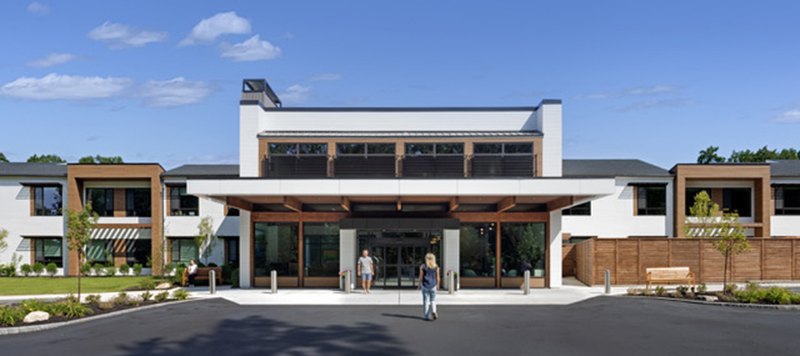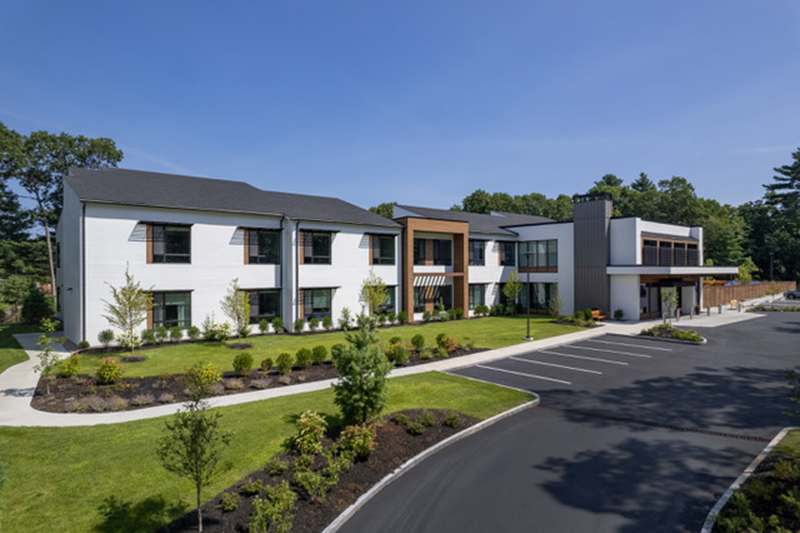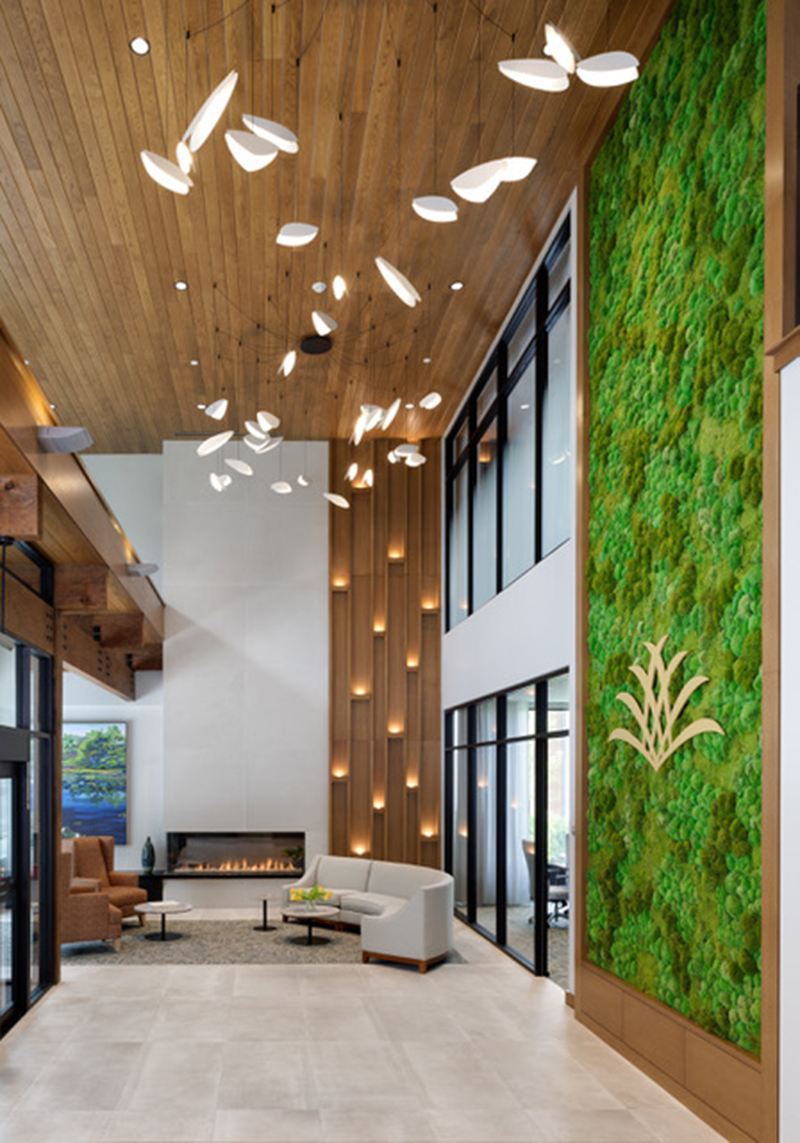The Architectural Team debuts
new 54-unit The Cordwainer

Norwell, MA The Architectural Team (TAT) has completed the new 54-unit all-memory-care community. Called The Cordwainer, this modern and inviting project aims to reimagine the care model by focusing entirely on a population with specialized care needs – and by taking design inspiration from nature to enhance resident health and wellness.
The 50,000 s/f complex opened in a wooded setting less than an hour from Boston. According to the project team, its focus on support services for the growing population of older adults with memory impairment, including Alzheimer’s disease, fills a crucial gap in the assisted-living world. Designed by TAT for developer and owner-operator Anthemion Senior Lifestyles, The Cordwainer is also notable for its learning-based programming and its use of biophilia, an approach to architecture and interiors that strives to enhance human wellbeing through greater connection to the natural world.
“Biophilia’s health and wellness benefits are frequently discussed in relation to high-end apartment buildings and workplace design, but the positive impacts can be especially profound for those with memory impairment,” said TAT associate Anthony Vivirito, LEED AP.

“With studies showing a connection between natural light and resident health outcomes, for example, there are compelling reasons for memory care providers and their architects to utilize the principles of biophilic design.”
TAT’s design for The Cordwainer reflects this creative focus, using an evidence-based approach that recognizes how light can have a significant impact on dementia by improving mood and reducing depression and psychoactive symptoms common to the disease. The resulting interior spaces provide a bright and airy atmosphere that uses natural materials like wood and living moss walls, and prioritizes thoughtfully modulated daylight – all integrated within an environment that is highly supportive and practical for residents. 
Key solutions include an expansive skylight set above the building’s centrally located two-story atrium sensory garden that floods the indoor courtyard with natural light and serves as a central socialization point of the community’s care program. In order to maximize daylight penetration deep within the building’s core, the design team added a series of large clerestory windows in common areas. In addition, three lightwells are spaced at equal intervals along the community’s north-facing facade, providing diffuse natural lighting to a series of activity rooms on the second floor.
The design team also oriented the residential units to the south and north for soft lighting from large, oversized tilt/turn windows. The west- and east-facing common lounge and dining rooms similarly benefit from daylong light penetration through floor-to-ceiling glazing. These design solutions for boosting natural light all work together to provide therapeutic sensory stimulation, helping ease the agitation some dementia patients experience throughout the day and especially when the sun goes down.
“The Cordwainer’s development drew on years of researching advanced memory care concepts in Europe and around the United States, which we then infused into the strategic brainstorming with the design team,” said Tamilyn Liesenfeld, co-founder of Anthemion Senior Lifestyles.“When we first visited this thickly wooded property, we thought it was a perfect setting to create a community that blends with local nature and reimagines how individuals can live and thrive in a setting created to the highest specifications in line with the latest research in dementia care and biophilic design.”
Every element at The Cordwainer reflects this commitment to industry leading memory care, blending a sophisticated, mid-century modern-inspired design sensibility with evidence-based and resident-centric functionality. For example, a range of spaces – including dedicated activity rooms, workshops, and informal “living spaces” – support the community’s proprietary dementia therapies programming called The Learned Environment, which incorporates curriculum-based activities involving art, music, and foreign language to stimulate cognitive function. The Cordwainer is also among the first memory care communities in the country to incorporate Tovertafel, a unique system that uses sensor-supported light projection to help seniors living with dementia engage in specially designed interactive games, with proven benefits to physical, cognitive, social and emotional wellbeing.
To facilitate easier year-round engagement and an energizing and healthy environment, The Cordwainer’s residential program also features open plan living and dining rooms on each floor, surrounded by residential suites. This community-oriented design allows residents and their families to safely watch meal preparation or chef demos from comfortable seating and tables realized in warm wood with light-toned finishes, and to enjoy relaxing lounge areas or activity and classroom space. The unit mix includes 47 single units and seven companion suites with private bedrooms.
Other amenities include the second level’s rooftop terrace off the private family suite where families can cook dinner and enjoy each other’s company in an in- and outdoor setting. Residents also can take advantage of a wood workshop, barbershop and salon, fitness center, resource room and performance and rejuvenation venues. A light-flooded sunroom offers safe access to the extensive outdoor courtyard with a water feature, pergola, gardening beds and a putting green.
The building’s corridors, elevators, and high-contrast interior color scheme eases wayfinding routes for the residents, fostering accessibility to and from apartments and ancillary spaces. Notable is the building’s central boulevard-style corridor with its direct access to the private and semi-private suites, providing the residents with clear access to common areas, from one end of the building to the other and helps motivate mobility. Reflecting its innovative position in the market, The Cordwainer also features electric vehicle charging stations for visitors and employees.
“Senior and assisted living environments are among the country’s fastest-growing residential markets,” said Vivirito. “As our population continues to age, it’s imperative that we look beyond traditional models and use design to enhance wellbeing and quality of life for residents of these communities. We believe The Cordwainer sets a powerful national case study for this forward-looking approach.”
Nobis Group awards Robinson and Moreira STEM scholarships

Ask the Electrician: Is summer a prime time for commercial electrical maintenance?

The rise of incubators and co-working spaces: The latest in life sciences - by Matt Combs

Careers in Construction Month focus on training and safety - by Joe Camilo








.png)
